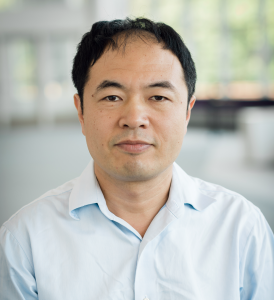Jingfeng Jiang (BioMed/HRI) is the principal investigator on a project that has a received a $346,966 research and development grant from the National Institutes of Health.
The project is titled “Personalized Management of Intracranial Aneurysms Using Computer-aided Analytics.”
Jinshan Tang (AC/HRI) is a co-PI on this potential four-year project, which could total $1,349,106.

Dr. Sangyoon Han is an assistant professor in Michigan Tech’s Biomedical Engineering department, and an affiliated assistant professor in the Mechanical Engineering-Engineering Mechanics department. He is also advisor to the Korean Students Association. He has been with Michigan Tech since 2017.
Han recently joined the Institute of Computing and Cybersystems and its Data Sciences research group. His primary research interests are in mechanobiology, cell migration, and image data modeling. His research goals include applying computer vision to microscopic images to capture meaningful information, and he’s looking for collaborators.
“Anyone with a good machine learning background is encouraged to contact me to discuss potential research,” he says. “Also, students who learned assignment problems or particle tracking are encouraged to contact me to discuss potential tracking-related projects.”
Teaching and Mentoring
Han’s teaching interests include computer vision for microscopic images, fluid mechanics, cell biomechanics and mechanobiology, and soft tissue mechanics. This academic year, he instructed Computer Vision for Microscopic Images in the Fall semester, and Fluid Mechanics this Spring.
Han enjoys teaching and interacting with students, “and feel their energy, too.” He says he makes a deliberate effort in his classes to pause from time to time so that his students can ask questions.
Han advises two Biomedical Engineering Ph.D. students, Nikhil Mittal and Mohanish Chandurkar.
“Nik is working on finding myosin-independent mechanosensitivity mechanism for stiffness sensing, and Mohanish works on the project finding mechano-transmission for fluid shear stress sensing by endothelial cells,” he says.
Research Aspirations
Han’s Mechanobiology Lab is interested in finding fundamental mechanisms governing mechanotransduction, and how cells sense mechanical forces and convert them into biochemical signals.
“We image cells and associated forces using high-resolution live imaging, which we analyze to obtain statistically meaningful quantity of data,” Han explains. “We apply force-measuring and molecular-imaging/analysis technologies for stiffness sensing, shear flow sensing, adhesion assembly, and cancer mechanobiology.”
Han is working to gain a thorough understanding of the mechano-chemical interaction between cancer cells and their microenvironment, and develop a an effective mechano-therapeutic strategy to stop the progression of cancer, and breast cancer in particular. Ultimately, he wants to apply that knowledge to cancer mechanobiology
Han is principal investigator of a three-year NIH/NIGMS research project, “Nascent Adhesion-Based Mechano-transmission for Extracellular Matrix Stiffness Sensing.” The research aims to determine whether newly-born adhesions can sense tissue stiffness through the accurate measurement of the mechanical force and molecular recruitment of early adhesion proteins.
Some Background
In 2012, Han received his Ph.D. in Mechanical Engineering from the University of Washington in the areas of cell mechanics, multiphysics modeling, and bioMEMS.
For his postdoctoral training, he joined the Computational Cell Biology lab led by Dr. Gaudenz Danuser in the Cell Biology department of Harvard Medical School. In 2014, he joined the UT Southwestern (University of Texas) Department of Cell Biology and Bioinformatics. Han received his B.S and M.S. degrees in mechanical engineering at Seoul National University, Korea, in 2002 and 2004, respectively.
Han holds several patents and in 2015, he developed an open-source TFM (Traction Force Microscopy) Package, which is shared via his lab’s website: hanlab.biomed.mtu.edu/software.
Beyond Research and Teaching
Han loves science and discovering something new in his research investigations. Beyond his work as a professor and scientist, he describes himself as a husband to Sunny, and a dad to his son, Caleb.
“I am just a normal Korean who likes singing and dancing,” he says. “Unfortunately, my voice is still recovering from surgery, but I hope to get back to it soon. I also like to listen to all kinds of music, including hip-hop, classics, and pop.”
He appreciates a good sense of humor, but he says that being humorous in American English is something he continues to learn.
Han says he tries to be “normal” and not too nerd-like when he’s not pursuing his research, but “there are times when I am making my own hypothesis about some phenomena I observe in my daily life.”
Han enjoys life at Michigan Tech and in the Cooper Country. He likes getting to know his energetic students and he finds Michigan Tech faculty members very strong and collegial. He also enjoys the snow, hockey, and the mountains.
“I really like the snow here. I am already sad that the weather is becoming too mild!” he confirms. “It’s also a safe environment to raise kids, which is a big plus.”
And he likes his academic department. “Everyone is so nice in the Biomedical Engineering program, they have been so welcoming and appreciative my research,” Han says. “It’s a family-like environment.”
Active Research
1R15GM135806-01 (09/16/2019 – 08/31/2022)
Funding Agency: NIH/NIGMS
Nascent Adhesion-Based Mechano-transmission for Extracellular Matrix Stiffness Sensing
Project Goals: To determine whether newly-born
adhesions can sense tissue stiffness by accurate measurement of mechanical
force and of molecular recruitment of early adhesion proteins using traction
force microscopy and computer vision techniques.
Role: Principal Investigator
Additional Information
The Mechanobiology Lab studies mechanobiology, particularly how adherent cells can sense and respond to mechanical stiffness of the extracellular matrix. To investigate this, the lab has established experimental and computational frameworks for force measurement and adhesion dynamics quantification. Researchers apply these frameworks, with cutting edge computer vision technique, on live-cell microscope images to investigate the fundamental mechanism underlying mechanosensation in normal cells, and the biomechanical signature of the diseased cells whose signaling has gone awry.
The Institute of Computing and Cybersystems (ICC) creates and supports an arena in which faculty and students work collaboratively across organizational boundaries in an environment that mirrors contemporary technological innovation. The ICC’s 60+ members, in six research centers, represent more than 20 academic disciplines at Michigan Tech. https://www.mtu.edu/icc/
The ICC Center for Data Sciences (DataS) focuses on the research of data sciences education, algorithms, mathematics, and applications. https://www.mtu.edu/icc/centers/data-sciences/
The National Institutes of Health (NIH), a part of the U.S. Department of Health and Human Services, is the nation’s medical research agency — making important discoveries that improve health and save lives. https://www.nih.gov/
The National Institute of General Medical Sciences (NIGMS) supports basic research that increases understanding of biological processes and lays the foundation for advances in disease diagnosis, treatment, and prevention. https://www.nigms.nih.gov/
Recent Publications
- Han, S. J.; Azarova, E. V.; Whitewood, A. J.; Bachir, A.; Guttierrez, E.; Groisman, A.; Horwitz, A. R.; Goult, B. T.; Dean, K. M.; Danuser, G. Pre-Complexation of Talin and Vinculin without Tension Is Required for Efficient Nascent Adhesion Maturation. eLife 2021, 10, e66151. https://doi.org/10.7554/eLife.66151.
- Schäfer, C., Ju, Y., Tak, Y., Han, S.J., Tan, E., Shay, J.W., Danuser, G., Holmqvist, M., Bubley, G. (2020) TRA-1-60-positive cells found in the peripheral blood of prostate cancer patients correlate with metastatic disease. Heliyon 6(1), e03263.
- Isogai, T., Dean, K.M., Roudot, P., Shao, Q., Cillay, J.D., Welf, E.S., Driscoll, M.K., Royer, S.P., Mittal, N., Chang, B., Han, S.J., Fiolka, R., Danuser, G., Direct Arp2/3-vinculin binding is essential for cell spreading, but only on compliant substrates and in 3D, BioRxiv, 2019
- Mohan, A.S., Dean, K.M., Isogai, T., Kasitinon, S.Y., Murali, V.S., Roudot, P., Groisman, A., Reed, D.K., Welf, E.S., Han, S.J., Noh, J., and Danuser, G. (2019). Enhanced Dendritic Actin Network Formation in Extended Lamellipodia Drives Proliferation in Growth-Challenged Rac1P29S Melanoma Cells. Developmental Cell, 49(3), pp.444-460.
- Manifacier I., Milan, J., Beussman, K., Han, S.J., Sniadecki, N.J., About, I (2019) The consequence of large-scale rigidity on actin network tension. In press. Comp Meth Biomech Biomed Eng, 2019 Oct;22(13):1073-1082.
- Costigliola, N., Ding, L., Burckhardt, C.J., Han, S.J., Gutierrez, E., Mota, A., Groisman, A., Mitchison, T.J., and Danuser, G. (2017) Vimentin directs traction stress. PNAS. 2017 114 (20) 5195-5200.
- Han, S.J., Rodriguez M.L., Al-Rekabi, Z., Sniadecki, N.J. (2016) Spatial and Temporal Coordination of Traction Forces in One-Dimensional Cell Migration, Cell Adhesion & Migration. 10(5): 529-539.
- Oudin, M.J., Barbier, L., Schäfer, C, Kosciuk, T., Miller, M.A., Han, S.J., Jonas, O., Lauffenburger, D.A., Gertler, F.B. (2016) Mena confers resistance to Paclitaxel in triple-negative breast cancer. Mol Cancer Ther.DOI: 10.1158/1535-7163. MCT-16-0413.
- Milan,J., Manifacier, I., Beussman, K.M., Han, S.J., Sniadecki, N.J., About, I., Chabrand, P. (2016) In silico CDM model sheds light on force transmission in cell from focal adhesions to nucleus. J Biomechanics. 49(13):2625-2634.
- Lomakin. A.J., Lee, K.C., Han, S.J., Bui, A., Davidson, M., Mogilner, A., Danuser G. (2015) Competition for molecular resources among two structurally distinct actin networks defines a bistable switch for cell polarization, Nature Cell Biology. 17, 1435–1445
- Han, S.J., Oak, Y., Groisman, A., Danuser, G. (2015) Traction Microscopy to Identify Force Modulation in Sub-resolution Adhesions, Nature Methods. 12(7): 653–656
Weihua Zhou, assistant professor, Health Informatics, and member of the ICC’s Center for Data Sciences, is the principal investigator on a project that has received a $24,497 federal pass-through research and development grant from Tulane University. The project is titled, “Trans-Omics Integration of Multi-Omics Studies for Male Osteoporosis.” This is a 7-1/2 month project.
